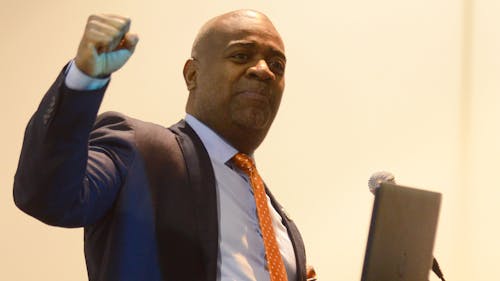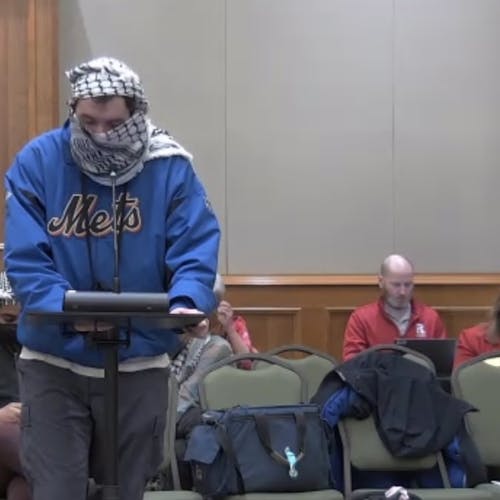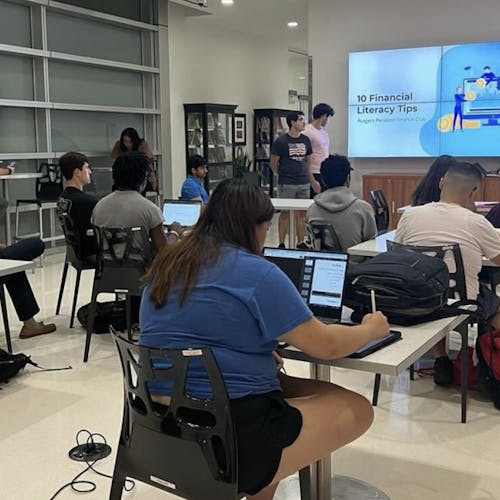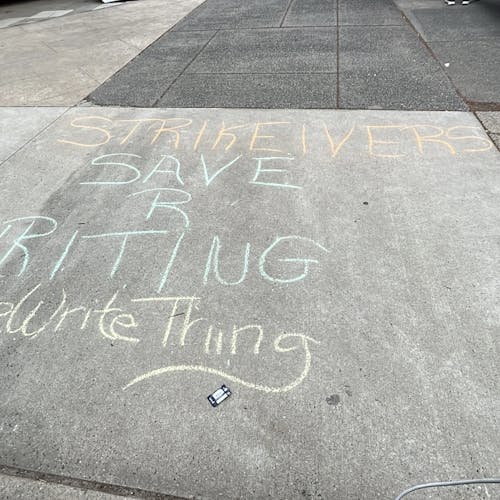Ras Baraka, Sister Souljah speak to Rutgers community about defining activism

College is all about discovering yourself, said Lisa Williamson, more widely known as Sister Souljah.
Souljah spoke about activism to members of the Rutgers community in the Busch Student Center on Tuesday night, providing attendees with a series of instructions on how to successfully enact social change.
The event was hosted by the Africana Studies Department, said Edward Ramsamy, chair of the department.
“My goal for tonight is to connect some of the contemporary issues, some of the contemporary struggles with the activism and heroes from the 1980s,” Ramasamy said. “That’s one idea, and (ask) the mayor, how do you lead in this era?”
Both Souljah and Newark Mayor Ras Baraka helped shape the idea of contemporary black life, said Brittney Cooper, an assistant professor in the Department of Women's and Gender Studies.
“In some ways they’re both changed by similar activist contexts,” Cooper said. “He’s sort of a child of the black power movement, she was really part of a radical arm of black politics within hip-hop.”
Souljah spoke about her experiences as a student activist and what it was like coming to Rutgers after an unprivileged upbringing in New York, and later, New Jersey.
“When I say I came from a poor family, I am not joking. I was overwhelmed in the cafeteria,” she said.
When she first came to college, Souljah said her focus was on excelling academically and taking advantage of what Rutgers had to offer.
“Since I viewed myself as ‘we,’ it mattered a lot how I spent my time, it mattered to me,” Souljah said.
Part of that meant studying more than just what her professors assigned, she said. Because of her extracurricular lessons, she was able to learn lessons about Africana Studies that were denied to her previously.
Souljah was also exposed to people from different backgrounds more than she had been used to.
“At this University was the first time I met African students from the global African community. (It was the) first time I learned about different cultures and languages, first time I met Muslim students,” she said. “(It was the) first time I had my mind and my thinking be globalized.”
To further her education, she applied to study abroad, earning scholarships to do so in the process.
“I think it is absolutely critical that every student in the room, (no matter) what continent you’re from, or even if you’re born in America, that you become conscious,” Souljah said. “(I want) to inspire student to get in control of their resources and culture and impact the world."
Student activists need to act as a collective and focus on what is important, Souljah said. This also applies to their personal lives.
Souljah is also known widely for her activism both at Rutgers and after graduation.
Part of the Rutgers endowment was invested in companies that operated in South Africa, which was still heavily segregated at the time, she said. She was a vocal member of the movement to have the University divest from these companies.
“We weren’t against our professors just because we’re students and they’re professors, we weren’t against the administration just because they were the administration, no, we had a particular issue,” she said. “We were against that money fueling racism overseas.”
Student activism is more than just protesting ideas people disagree with, she said. It is about creating an agenda and following it through, which meant sitting at meetings and garnering support from the community.
It also meant continuing despite the opposition, she said.
“When you fight they fight back, when you push forward, they push back, and that’s okay because I’m not advocating fear,” she said. “I am advocating organization, intelligent planning, follow-up study and sacrifice.”
Activists must be prepared to sacrifice some of the luxuries in their lives, like parties, to accomplish their goals, she said.
Students should be at the forefront of activism as well, Baraka said.
“Hopefully (students) get more active and more involved and let us change some things that need to change,” Baraka said. “They should get politically involved earlier. Young people have already indirectly led movements in this country, and I think they should stay engaged.”
Many activists will face opposition, Baraka said, citing incidents seen at Republican presidential candidate Donald Trump’s rallies.
“If you try to defend people, you’re attacked for defending people because you’re not giving them the freedom of being a barbarian,” Baraka said.
The process can begin in college, Souljah said.
“It doesn’t make any sense to be in such a wonderful place lost and confused, when this is the exact place where you can become conscious and aware, where you can clean out yourself and you can take your place in the world,” she said.
___
Nikhilesh De is a School of Engineering junior. He is the acting news editor for The Daily Targum. Follow him on Twitter @nikhileshde for more.



